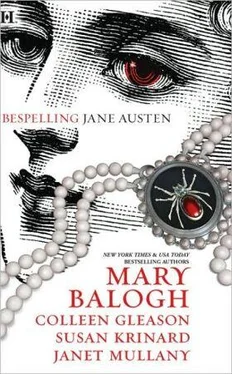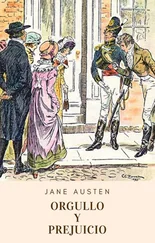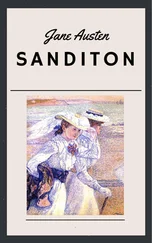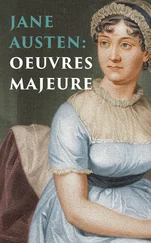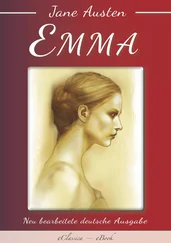He turned them off the driveway without further ado, and they were soon deep in the shade of tall, ancient trees. The silence and seclusion seemed deeper here than on the driveway.
“Tell me about Miss Jane Everett,” he said.
“Oh,” she said, “there is no question better designed to tie my tongue. What can I tell you about myself? I am the middle sister of three—but you already know that. We are not close, alas, even though I believe we have a sisterly regard for one another. Louisa is interested more than anything else in rank and fortune and what is her due as the eldest daughter of a baronet. Edna is interested more than anything else in making a good marriage and achieving the sort of importance it will give her in society.”
“And Miss Jane Everett?” he said as they drew clear of the trees and the lake water sparkled below them, at the foot of a sloping lawn. “What interests her more than anything else? Neither fortune nor marriage?”
“Any sensible lady has a regard for both,” she said as she drew him in the direction of the south side of the lake. It was wooded to the bank and was scarcely used, despite the existence of the summer pavilion. “But either or both in themselves would not bring total satisfaction or happiness. Not to me, anyway.”
“What would, then?” he asked, stopping for a moment to admire the view. “Love?”
“It is a word that has so many uses and so many of them trivial,” she said, “that it has become largely meaningless. And it is a sentiment at which men tend to scoff, I know.”
“I am to be lumped in with all men, then?” he said. “Are you sure you do not do me an injustice, Miss Everett?”
“I long for… meaning in my life,” she said. “For something that will make it worth living. Something like spending my life in search of a great pearl and knowing that there can be no true happiness until I have found it. Except that it is not a pearl for which I seek or indeed any material possession. I do not know what it is. Love, perhaps? But I do not really know what that means.”
“The search,” he said softly, “is always about love.”
It should have sounded absurd but did not. Somehow it sent shivers along her spine and made her feel weak at the knees. It caught at her breath.
“We must go single file from here. Captain Mitford,” she said, sliding her hand free of his arm. “The path is narrow.”
She walked ahead of him, and they no longer talked.
The search is always about love.
What did he mean? The words had not been trivially spoken—or flirtatiously.
And yet she felt somehow caressed.
What was happening to her?
She turned her attention determinedly to her surroundings. She loved this place. She had come here a number of times with her mother, and had continued to come after her death, at first to remember her, and then mostly to sit and dream. This was almost the only place where she allowed her imagination to roam—that imagination that really had nothing to do with making up stories for her dolls in the nursery. Here she dreamed of two lovers—one of them herself—meeting and loving. And parting. It was the inevitable ending, try as she would to give the story a happy conclusion. But hope always brought her back to dream again of those lovers.
Who always seemed very real.
As did the ending of their story.
Which needed to be changed.
“This is lovely,” Captain Mitford said as they came up to the pavilion and stepped around to the front of it. He laughed. “That word again. There ought to be more words to describe extraordinary beauty. This scene is…well, it is lovely. And it is you. ”
“Me?” she said, her eyebrows raised.
“Small and secluded and peaceful and mysterious and lovely beyond words,” he said.
“Then it is certainly not me,” she said with a laugh, though the outrageous compliment pleased her.
…lovely beyond words.
“You do not see yourself through my eyes, it would seem, Miss Everett,” he said.
She felt herself blushing and turned her back in order to sit on the wooden bench to one side of the door of the little house. The walls were covered with ivy. Pink roses grew in an arch over the lintel and over a trellis above the bench. Their fragrance filled the air.
“In what way am I mysterious?” she asked as he seated himself beside her and propped his cane against the end of the bench.
“Only in that you are quiet and reserved,” he said, “and I wonder who you are. I wonder if you are who I believe you very well might be.”
She turned her head and looked at him for some time in silence. She was not sure she wanted to ask the obvious question. She felt a little afraid again. This was all quite beyond anything she had experienced before.
She felt as if floodgates were about to be opened on her life, ones she had kept determinedly closed for a long time. Or perhaps it was merely that she had met a handsome man and was falling into a foolish infatuation.
“You know who I am,” she said.
He rubbed his leg absently and gazed out over the lake.
“Was it very badly injured?” she asked him.
“My leg?” He stopped rubbing. “Most of my injuries came from a sword and a dagger when two enemy soldiers attacked me in battle, one from the front and one from the rear. According to the army surgeon, any one of those wounds ought to have killed me. But I also had the misfortune to fall from my horse and land on my head. My horse crashed down on my leg and crushed it beneath his body until I was rescued an hour or two later. My concussion should have killed me. So should my leg, especially after I refused to have it off.”
“The army surgeon must have been very skilled,” she said, “despite his gloomy predictions.”
“The army had to move on,” he said. “I was far too badly hurt to go with it. I had to be left behind in the care of an Indian family who were related to my batman. It was they who nursed me back to health. I was with them for longer than a year. Despite all the fever and pain, it was in many ways the happiest year of my life.”
“But you did not want to stay forever?” she asked.
“I was not meant to remain there,” he said, “though I believe I could have been happy there. I was meant to return here.”
“By your family?” she asked. “Your regiment?”
“Those, too, I suppose,” he said. “But I meant by life. This is where I am intended to live my life.”
“In England?” she asked. “But to what purpose? What is it you need to find here?”
He hesitated a moment.
“Do you believe,” he asked her, “in soul mates?”
He turned on the bench to look directly into her face as he asked the question. His eyes looked very intense and very blue.
Jane felt a sudden coldness in the head as though she were going to faint. The floodgates creaked.
“Soul mates?” she asked, almost in a whisper. She had never heard the term, and yet she knew.
“Two souls that were created to belong with each other from eternity to eternity,” he said. “Two souls that seek each other out lifetime after lifetime until the time is right for them and they can love each other totally and unconditionally and move onward together to the next phase of their eternal growth.”
“From eternity to eternity?” she said. “Do our souls not begin with human birth and proceed to a permanent eternal home after human death? It is what our religion teaches.”
“Do you really believe that?” he asked her. “Why should a human man and a human woman have the power to give birth to an eternal soul when they have a child? Is it not far more believable that the soul in a human body comes from eternity and returns to eternity at death?”
Читать дальше
